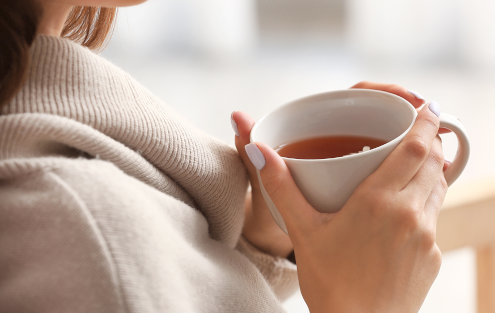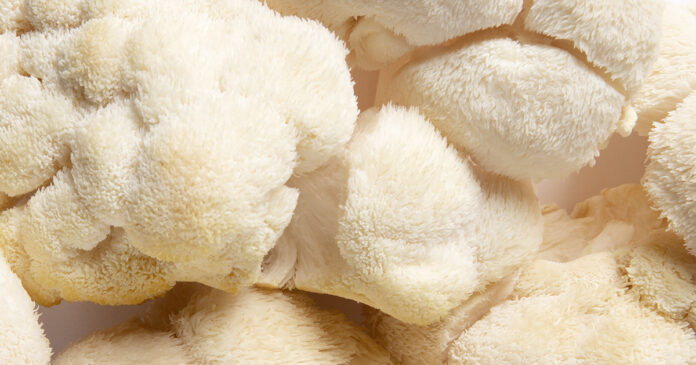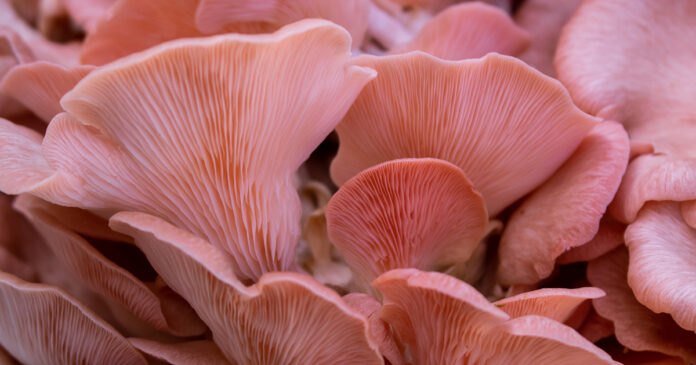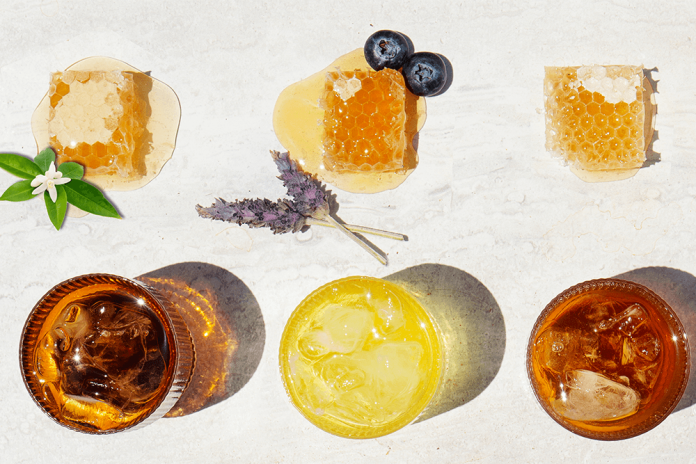When you’re busy or anxious, the quiet ritual of preparing and drinking tea can be incredibly soothing.
But there’s more to the calming effects of tea than simple enjoyment, or even mindfulness. Several natural compounds in Camellia sinensis teas (true teas) may help support a healthy brain and a state of calm focus. (1)
And herbal or botanical teas are also full of calming phytochemicals and antioxidants that can support your body during times of stress.
Keep reading to discover the top six calming teas supported by science, plus five more tasty teas that are perfect for unwinding.
What is a good calming tea?
A calming tea is any tea that supports a state of relaxation.
The underlying mechanisms vary with different types of beverages, as we’ll discuss more in depth shortly.
There’s solid evidence showing green tea supports a calm mental state. (1) And in many cases, the calming effects of herbal teas are also supported by credible research.
But the best test of all is how you feel when you drink a cup of tea. Because people respond differently, it pays to experiment with different calming teas to learn which are your favorites.
And let’s not forget flavor and quality, either. The best calming teas are delicious, made from real ingredients, and free of unnecessary additives or fillers.
Can tea really relax you? Calm energy vs. bedtime herbal teas
Yes, tea can be extremely relaxing.
Even though true teas (such as green and white tea) all contain modest amounts of caffeine (a stimulant), they also contain a unique, calming acid called l-theanine.
A 1999 scientific trial conducted on people with low or high anxiety levels found that taking l-theanine led to a more relaxed state for all participants, regardless of starting anxiety. (2)
L-theanine in tea also works synergistically with caffeine to support focus, while reducing some of the harsh side-effects of caffeine like jitters and overstimulation. (3)(4)
Note that oxidized teas (such as black tea) contain more caffeine and less theanine than white or green varieties, which is why they’re among the best teas for energy. (5)
Camellia sinensis teas also contain other phytochemicals like EGCG that, along with theanine, make the caffeine in tea feel different from coffee. (6)
However, caffeinated teas are not the best choice before bed. Although theanine takes the harsh edge off caffeine, the stimulant effects of caffeine can still disrupt your sleep quality.
That’s where herbal teas come in. Because they’re naturally caffeine-free and contain compounds that support relaxation, they’re the ideal option to de-stress before dozing off.
In the next section, you’ll learn the best true teas and herbal teas to add to your tea-drinking rotation anytime you need calm energy or sleep support.
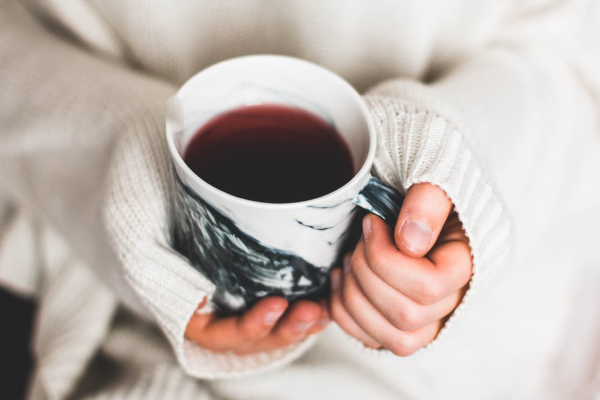
The Top 6 Teas for Calming Down
1. Matcha Tea
For calm energy, even during times of stress, there’s no tea like matcha tea.
Because of how it’s consumed, matcha provides significantly higher amounts of beneficial theanine than infused teas.
Matcha is a finely-ground tea powder that’s whisked into hot water, then sipped without filtering, meaning you get around four times higher levels of green tea compounds compared to tea infusions. (7)
For the highest theanine content of all, opt for shade-grown matcha. (8)
A recent study found that cookies with 2.5 grams of added matcha per serving helped stressed-out pharmacy students unwind. (9) The researchers did use a placebo control group without EGCG, which tells us the beneficial effects they measured weren’t just from eating yummy cookies!
Check out our delectable spin on calming matcha cookies here.
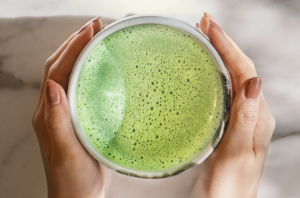
2. Gyokuro Green Tea
Not everyone cares for the vegetal taste of matcha, and flavor and enjoyment are key aspects of enjoying your personal calming tea ritual.
Gyokuro is a variety of high-quality shade-grown tea from Japan. The name translates to “jade dew” or “jewel dew” because of the beautiful, pale green color of the brew.
The covering-culture shade-growing technique dramatically increases the theanine content of gyokuro, lending it a decidedly umami (savory) flavor, but without the grassy, earthy, or leafy notes of matcha. (10)(11)
People typically describe it as mellow, sweet, and rich or full-bodied.
The correct preparation of gyokuro also differs from most other green teas, with higher concentrations of tea leaf (1-2 grams per ounce of water) and lower temperatures (120-140° F).
The higher the quality of gyokuro and the more leaves you’re steeping, the more times you can infuse it, raising the temperature by 10-20° F each time.
3. Chamomile Tea
A warm, comforting cup of chamomile tea is what comes to mind for many people when they imagine calming teas–and rightly so.
As tisanes or herbal teas, chamomile species from the Asteraceae family are naturally caffeine-free, making them a great choice for stress relief before bed, or for people who are sensitive to caffeine.
Researchers think a flavonoid compound called apigenin that acts on the brain’s GABA receptors is responsible for the calming effects of chamomile. (12)
Low doses of chamomile have mild tranquilizing and calming effects, while higher doses (around ten times higher!) appear to act as a sleep-inducing sedative, according to limited human studies. (12)
Chamomile tea bags are very common, but we recommend going the extra mile to obtain loose chamomile flowers. That way, you can easily adjust the strength, not to mention add it to your own custom blends with the other tisanes listed below.
4. Lavender Tea
You may already be familiar with the well-known, evidence-based effects of lavender essential oils in aromatherapy for sleep and reducing stress levels. (13)
But did you know that in herbal medicine, lavender tea infusions are considered a natural remedy for stress in their own right?
It’s true, and the consumption of lavender tea is now partially backed by research as well.
A 2015 trial involving 80 sleep-deprived postnatal mothers found that drinking lavender tea brightened their moods, reduced their feelings of tiredness, and helped them bond with their infants. (14)
You definitely don’t need to be a new mom to appreciate the benefits of lavender, though. For best results, be sure to pay attention to your breath and deeply inhale the calming vapor as you enjoy a soothing cup of lavender tea.
Another way to savor the relaxing effects of lavender is to incorporate it into herbal blends or recipes, where it can complement the effects of other natural stress-busters.
One such recipe is our calming lavender reishi latte.
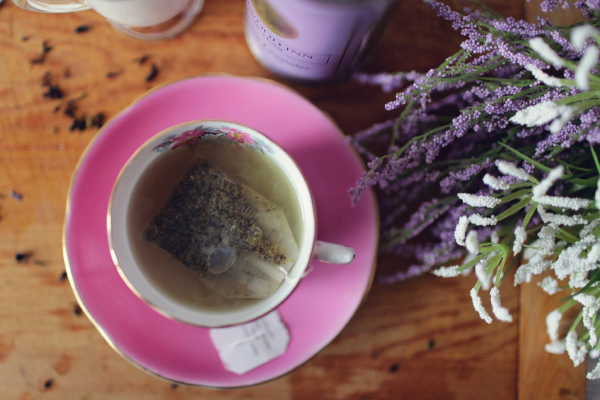
5. Passionflower Tea
Passionflower (Passiflora incarnata) is not only breathtakingly beautiful, but also makes a delicious calming tea.
It contains grassy, earthy, and floral flavor notes, and goes well with honey.
Several clinical trials have investigated passionflower tea or extract for sleep quality, insomnia, and anxiety symptoms with favorable results, making it one of the most credible herbal teas for winding down at night. (15)(16)(17)
6. Lemon Balm Tea
Lemon balm (Melissa officinalis) is an aromatic relative of the mint plant, and true to its name, has strong yet refreshing notes of citrus.
Scientists think lemon balm works by boosting GABA levels. (18) Two small studies have shown promising results for sleep, mood, anxiety, and stress. (19)(20)
Lemon balm’s very easy to grow yourself. The stems and fresh leaves make a delightfully balanced tea that’s bright and slightly acidic, yet with subtle mintiness.
Honorable Mentions
These tisanes are well-loved favorites for relaxing, but aren’t currently supported by scientific evidence for that purpose:
- Hibiscus tea
- Lemongrass tea
- Peppermint tea
- Tea made from rose petals
- Licorice root tea
Of course, a lack of evidence doesn’t mean they’re ineffective for de-stressing. It could simply mean their benefits are unproven thus far.
And they all boast interesting flavors, making any of them a worthwhile addition to your homemade custom herbal tea blends.
Final Thoughts: What can I drink to calm my nerves?
When you want to calm down or set aside some time to relax, any tea that you enjoy drinking is a fantastic choice.
That said, some teas have more evidence behind them for supporting calm.
Green tea supports a state of relaxed focus that’s perfect for daytime use, and it also has other health benefits.
But for bedtime, or for people sensitive to caffeine, herbal teas like chamomile are a better choice to unwind.
